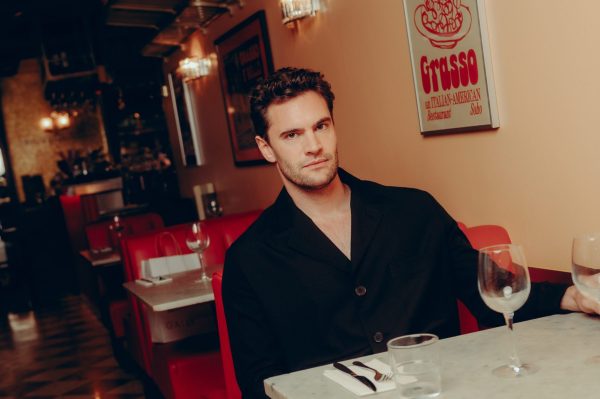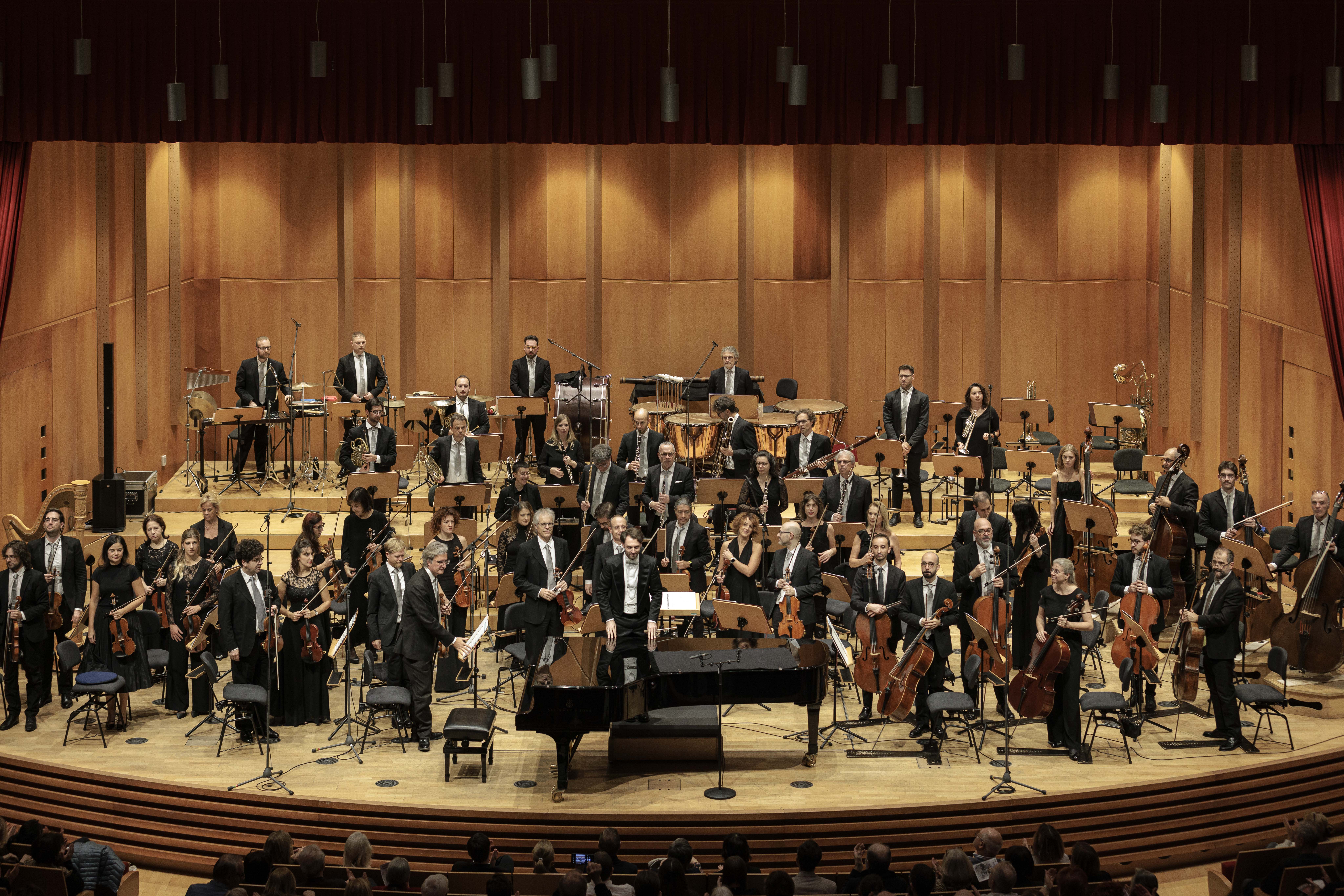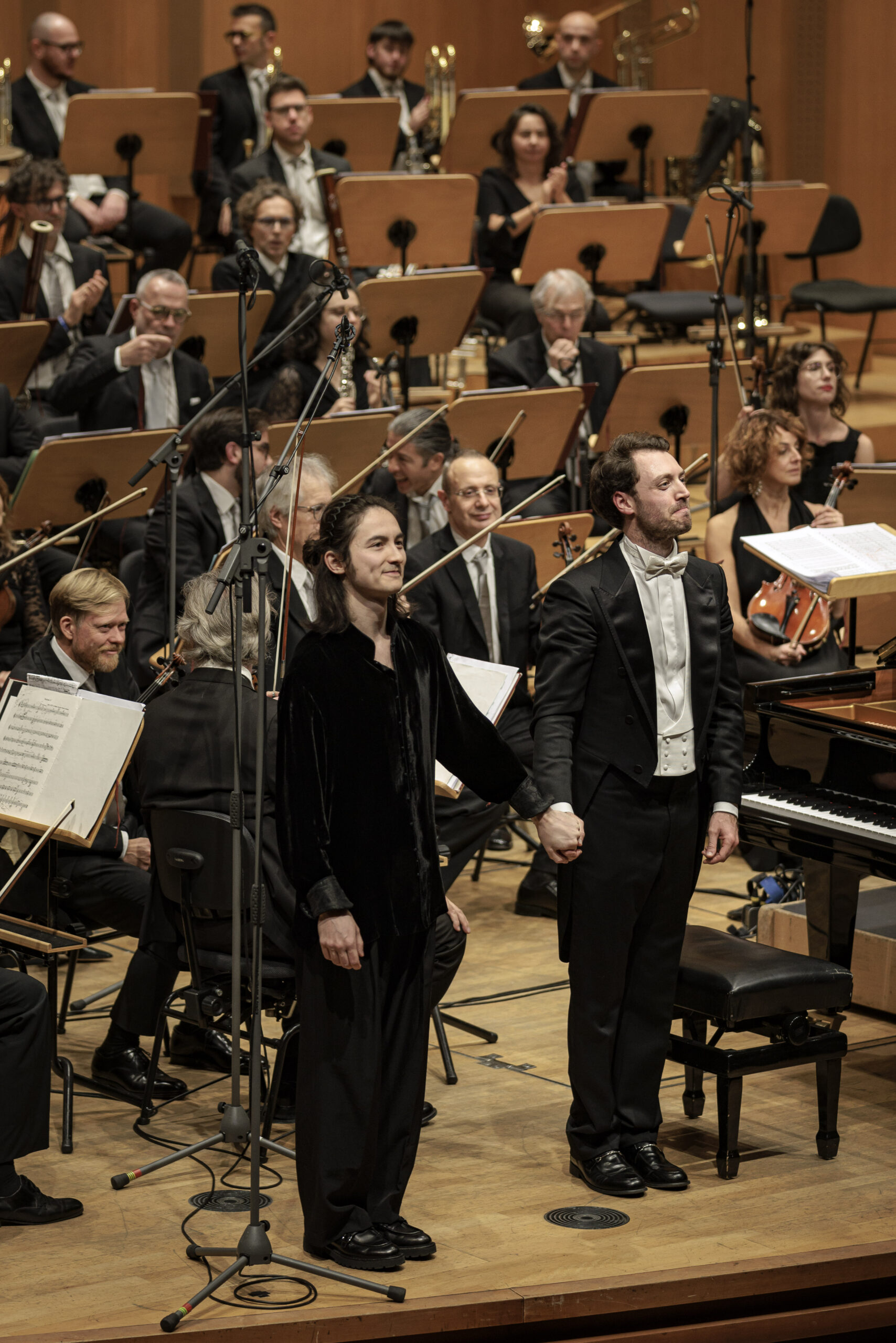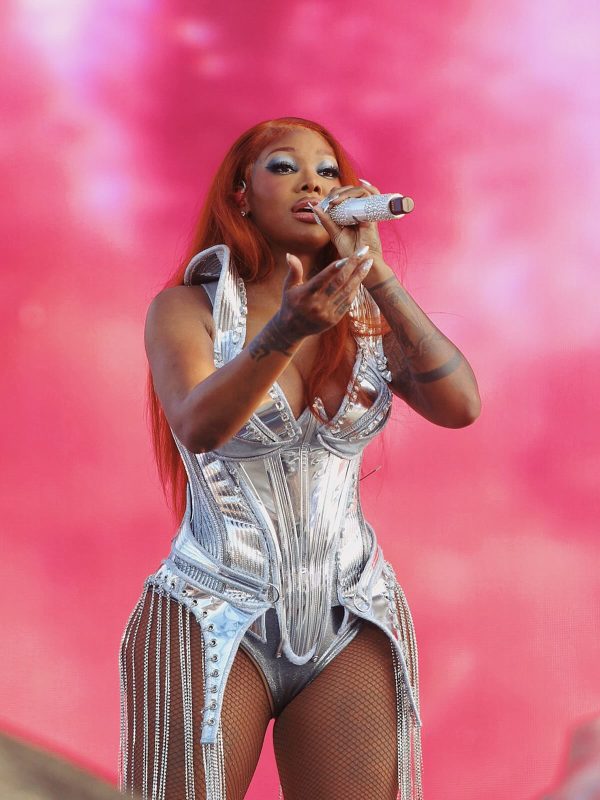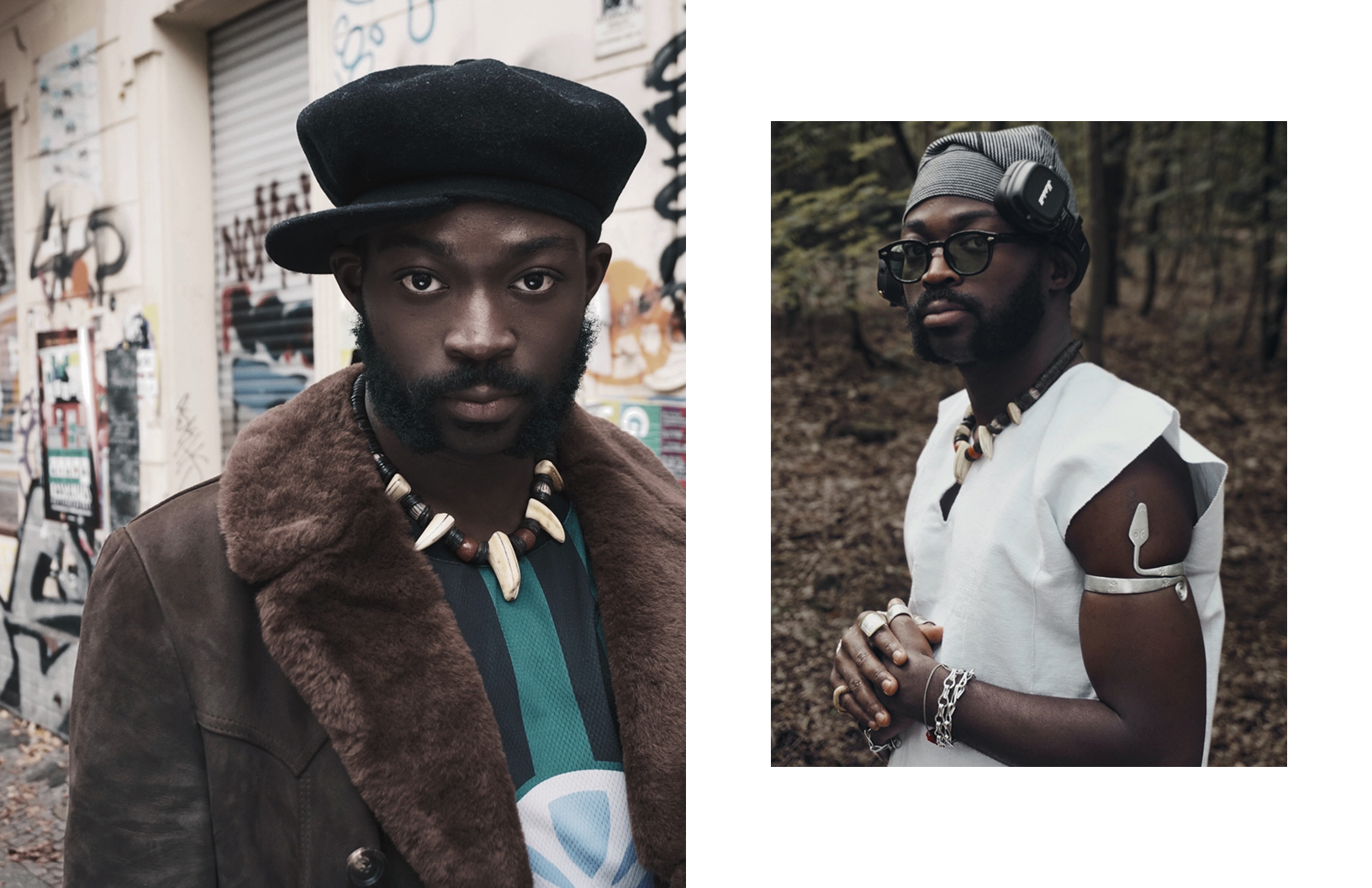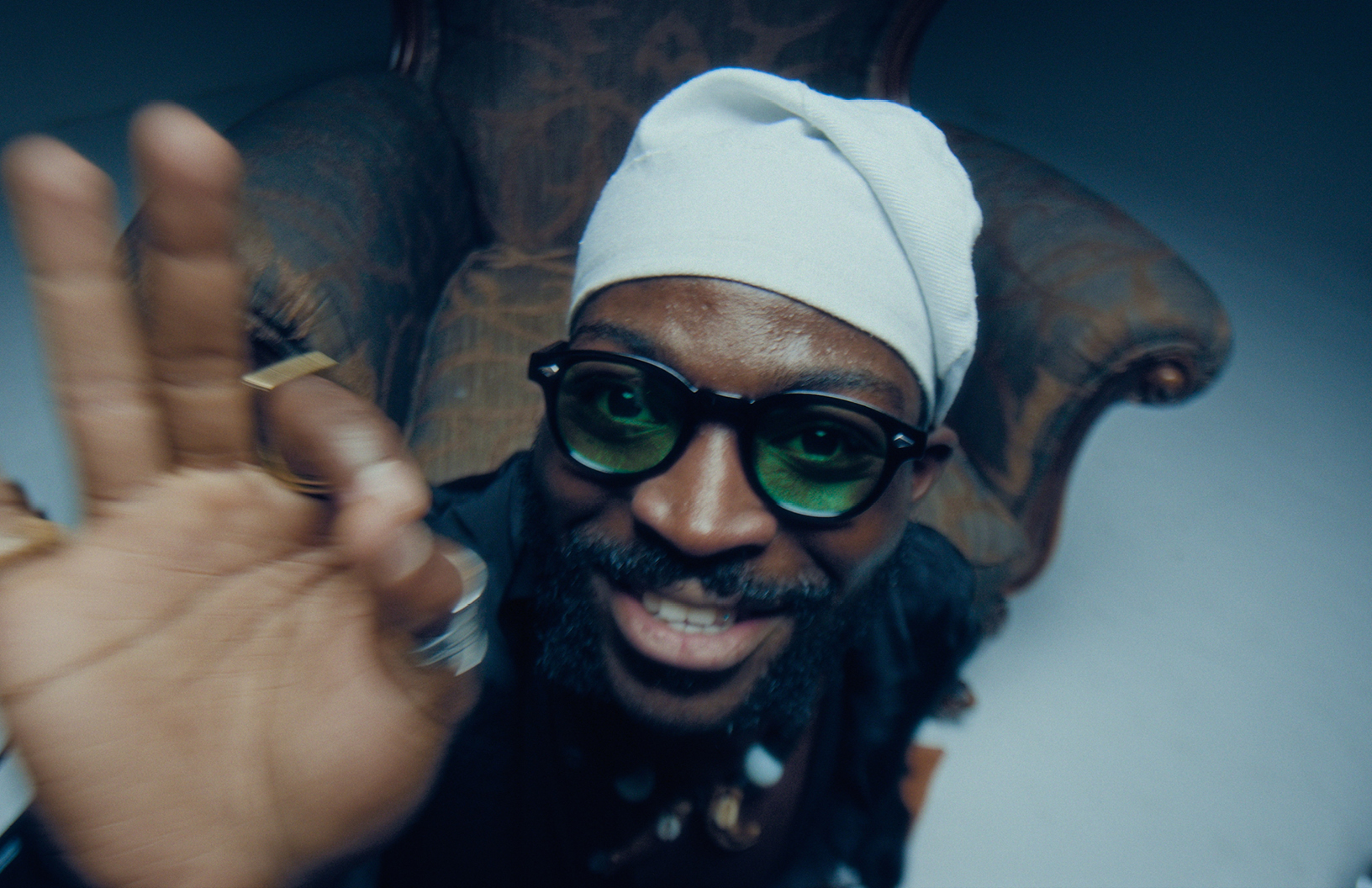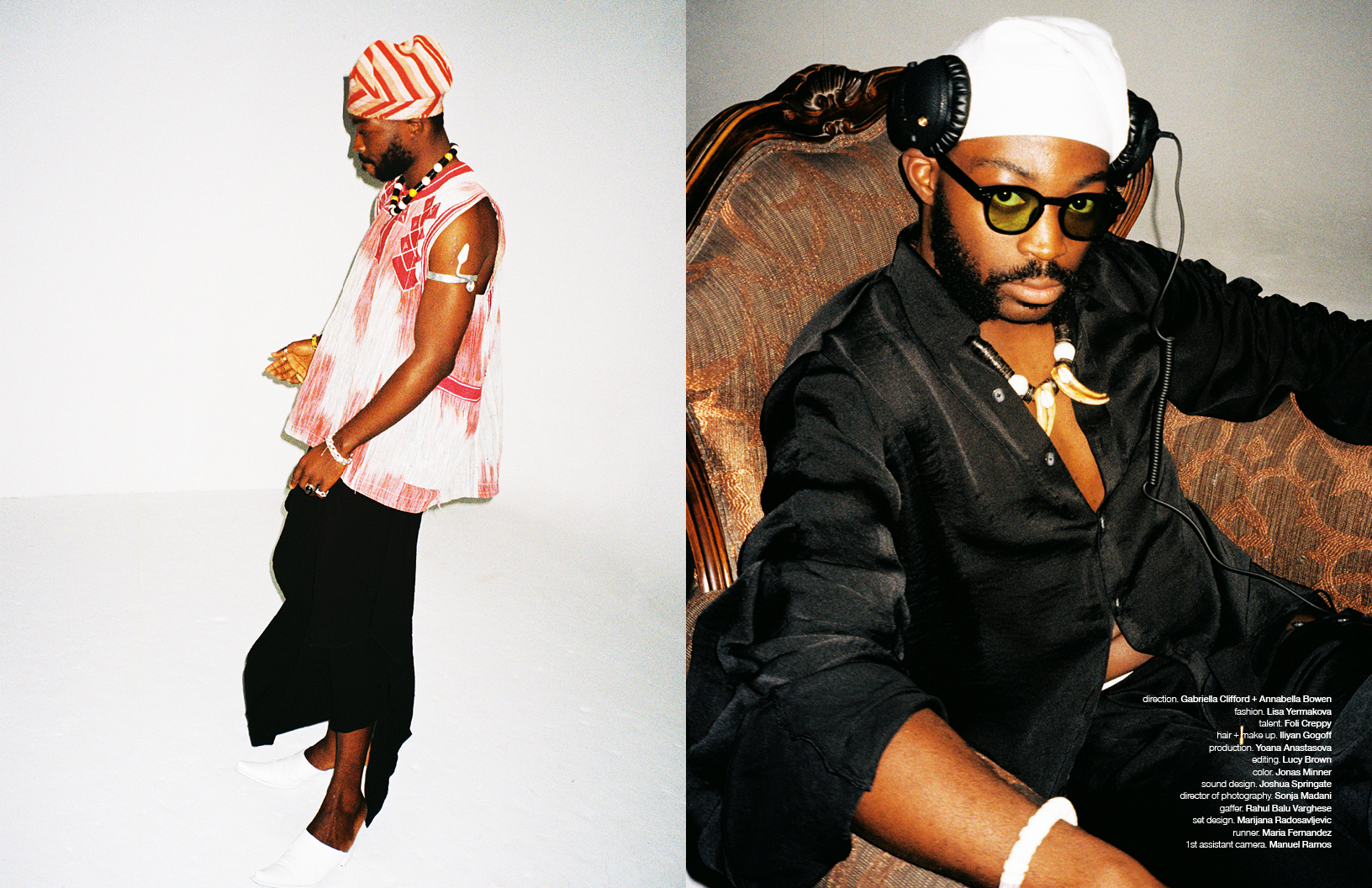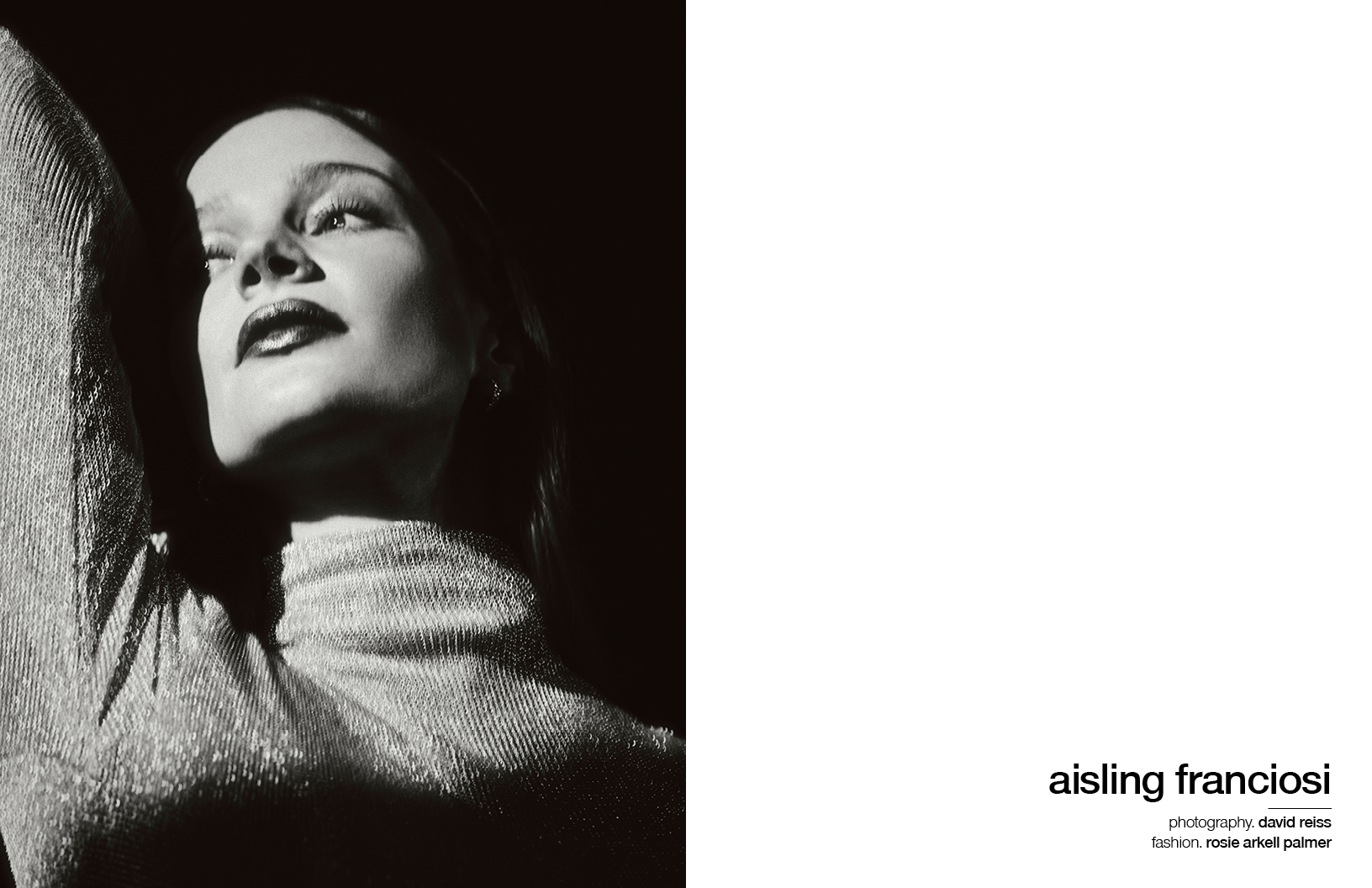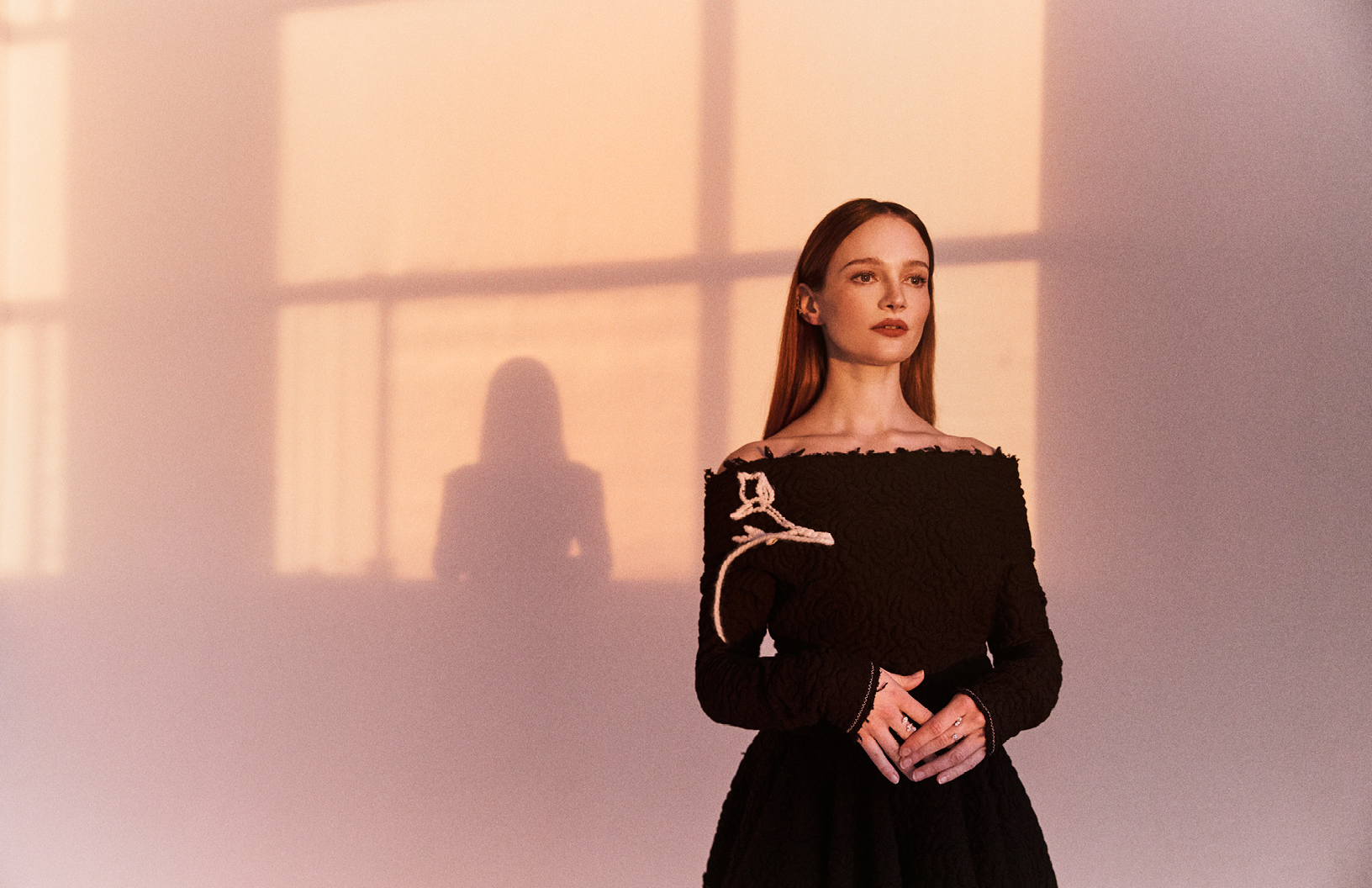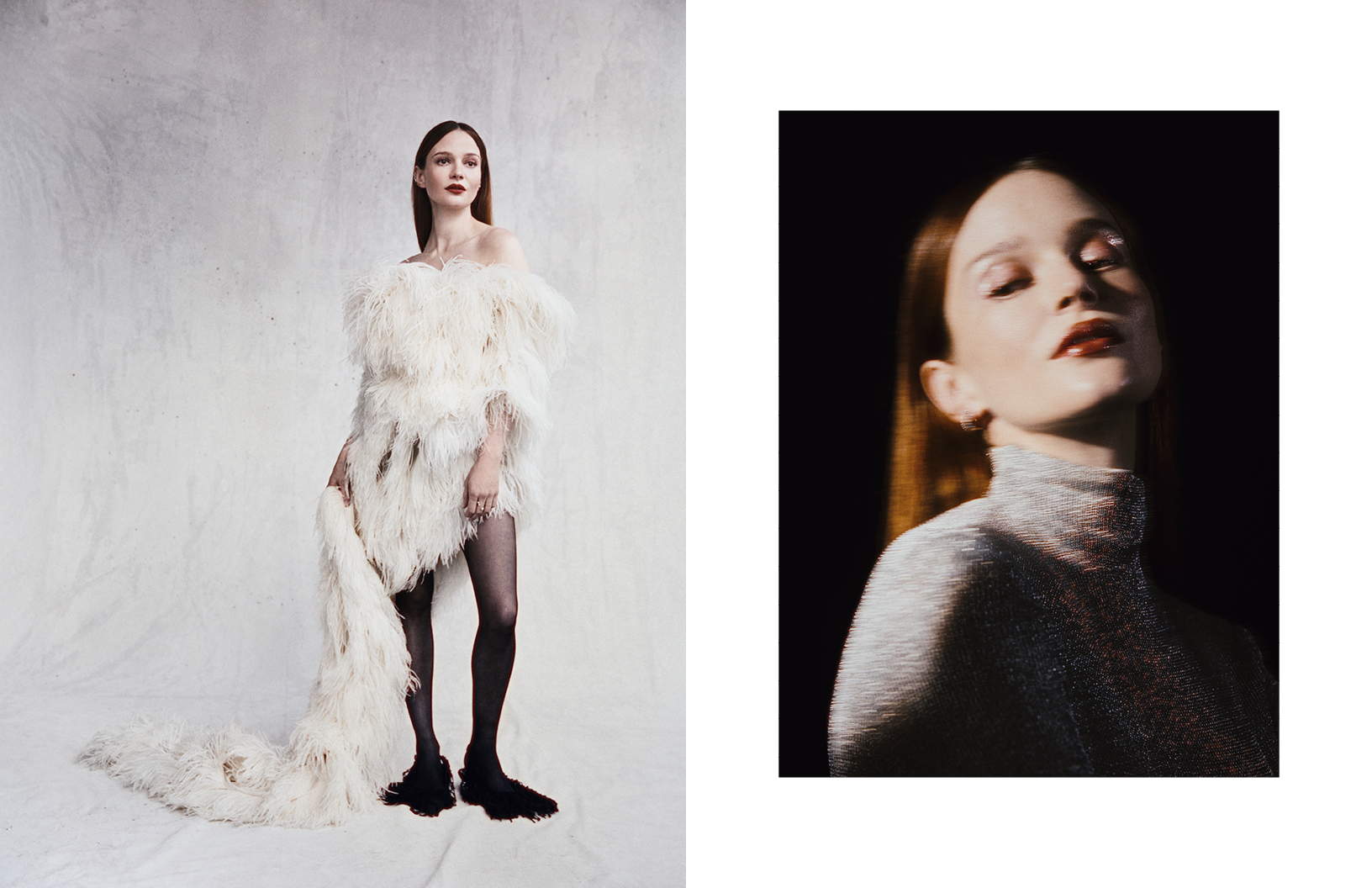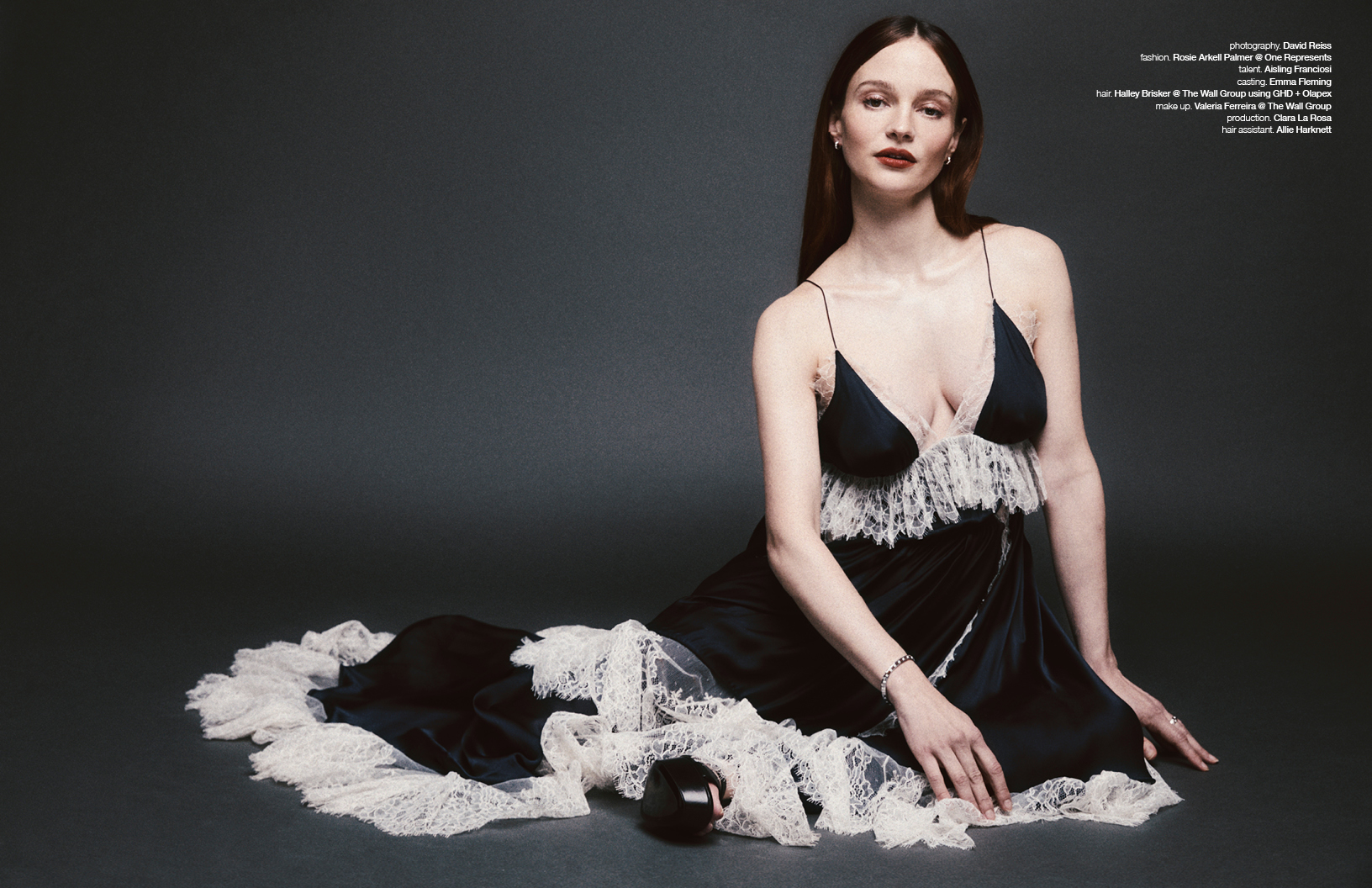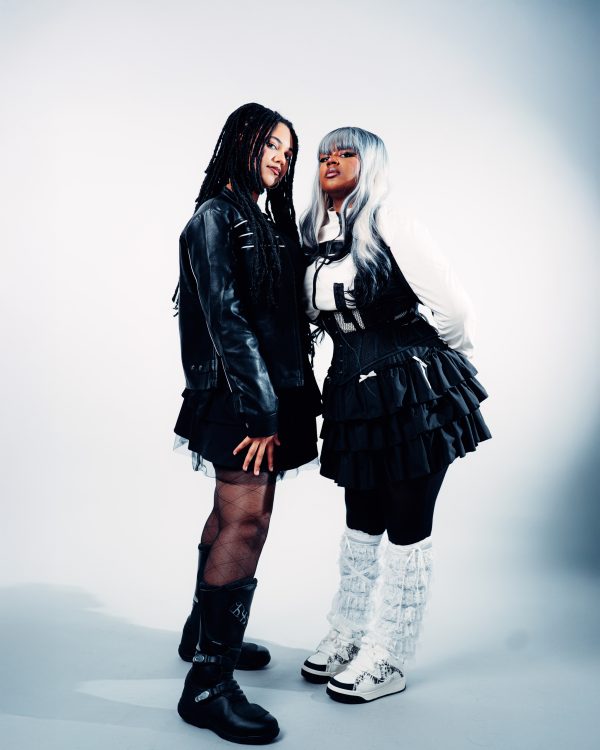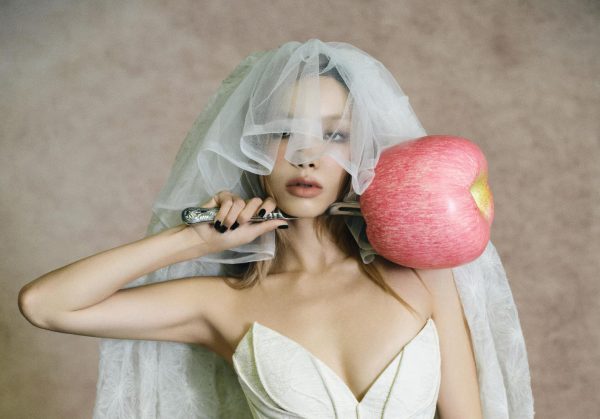
coat. Christian Siriano
shoes. YSL
jewellery. Cartier
opposite
dress. Helsa
jewellery. Cartier
Kathryn Gallagher is in flux. When speaking with the 31-year-old actress, singer, and songwriter, it’s clear that change is something she leans into rather than shies away from. For her, change brings newness — something that can be terrifying but also invigorating, forcing her to enter every project, role, and chapter of her life with a brand-new mindset. It’s that energy that has carried Gallagher from project to project, particularly with her film debut in Woman of the Hour.
The crime thriller film, which is directed by and stars Anna Kendrick, is set in 1970s Los Angeles and interweaves the stories of the women who were killed by a serial killer. While it doesn’t entirely fall under the true crime genre, it does what so many similar media fail to do which is to put the victims and survivors at the heart of the story. Rather than focusing on the serial killer, Kendrick opts to show the ripple effect of what happens when women are not believed. Naturally, Gallagher shines as Charlie, a flight attendant who is beginning a new chapter of her life. It’s a role and film that clearly matters deeply to Gallagher, especially given the current political and cultural climate that we’re in.
When we talk, she’s in sunny Los Angeles with her dog, Willie, who frolics around while we chat. It’s been a week or so since the election and things are, as expected, heavy. We joke about dual citizenships and fleeing the country, but it’s apparent that Gallagher, who campaigned for Harris during the lead-up to the election, isn’t going anywhere. Despite the outcome, she’s optimistic that art — film, music, and beyond — will continue to bring attention to the issues that impact women in particular, as depicted in Woman of the Hour.
One example of that commitment is “The Sweetest Song”, a track she penned for the film at Kendrick’s request. Although it’s imbued with the motifs and themes of the film, it’s a personal song for Gallagher and marks a shift in her artistry and her lyricism. Equal parts vulnerable and cutting, the track is Gallagher at her most Swiftian with her singing, “I never spoke ill, I just spoke the truth/And if you don’t like how it sounds… change what you do.” For her, creating art is the way to take back control and push back against outdated and problematic mindsets and rhetoric.
Speaking with Schön!, Kathryn Gallagher discusses why the themes of Woman of the Hour are just as timely today as it was in the ’70s, her new track “The Sweetest Song,” her work with the Joyful Heart Foundation, and more.

coat. Christian Siriano
shoes. YSL
jewellery. Cartier
opposite
blazer + trousers. Stella McCartney
shoes. Jimmy Choo
jewellery. Cartier
Kathryn, I don’t normally start my interviews this way but I have to say: I didn’t realize how much of a Swiftie you were until I was doing my research. I love that you met your best friend because of the reputation era and I met mine during Fearless.
Oh my gosh, yes. See, this is excellent. I believe becoming friends because of Taylor Swift is the most elite way a friendship can be born if I say so myself. We’re all just deeply feeling and deeply romantic. There’s a sense of earnestness within Taylor fans that’s beautiful.
What’s your favourite song?
That is an incredible question. I feel like, just to honour my history, I have to say “All Too Well” (10-minute version) because I’ve been campaigning for it on the internet for years. It’s such a hero’s journey to finally get it. But then Tortured Poets really messed me up. “The Black Dog” is really up there, “The Smallest Man Who Ever Lived” is really up there. But also, “Cold As You” is an original number one for me. “Should’ve Said No” is an original number one for me. Then we go to, like, “I Almost Do. It’s too hard! What about you?
It really depends on the mood or context. “Tied Together With A Smile” from her debut album will always be a favourite.
Yes! I’m so excited for the re-recording and what that’s going to sound like. People are going to freak out. So many people don’t get it because they weren’t there like us [laughs].
Exactly! Okay, I’ll start the interview now — how would you describe your growth as an actress, musician and songwriter between your first projects to now?
That’s a great question. You know, I think I always sort of feel like I’m starting over. Every single time I’ve ever gotten a job, the first feeling I have is like, are they sure? Do I know how to do this? What if I don’t know how to memorize my lines? How has anyone ever done this? What if it was a fluke? The first time I start anything, I always feel like I’m brand new again. I’m sure I’ve had some growth, but I can’t think of it. My growth is in trusting the process of things. Knowing that to get somewhere great, it has to take a million different routes, is something I didn’t fully trust. I used to feel like I needed results immediately. Now, I’ve been lucky enough to perform a job for almost 10 years. That’s crazy. Whatever medium it is that I’m getting to write or perform or produce, knowing that every route to the end result is different, every end result looks different, and what you get out of everything is different. I’m trying to be very present in the little takeaways from each project. So I think my growth is just to be patient.
Do you think coming to a project and feeling like you’re starting over brings you a kind of calmness, almost like you’re a constant student of the universe?
I think that’s a great point. Feeling like I’m starting over every time allows me to not be scared of new beginnings which is one of the craziest things about doing anything creative because having a gig job means that it’s always new. You’re always meeting new people and entering new spaces. You can’t really get comfortable anywhere. Learning to be comfortable in that discomfort, learning that being uncomfortable is when good things happen, is something you can only really learn from having been uncomfortable a lot. I was just talking with some friends about another big thing: not holding grudges. It’s so hard to navigate all of this gracefully because there are so many times you don’t get a job, or something shady happens, and it all feels so personal because your job is your personhood.
It’s exhausting, I couldn’t imagine stepping into an audition and knowing that what I do during those 10 minutes could just be based on my appearance or something else.
Yeah, and you as a writer, too. You not getting a job because they didn’t like your writing, which is also your thoughts!
Exactly!
I think learning how to navigate and maintain your personhood and creating a distance between work and self is important. I always try to have a lot of hobbies. That’s something I’ve tried to be better at as I’ve gotten older, whether it’s cooking or sewing. Hobbies outside of work help.
Yeah, anything that’s outside of your profession. Not to make this about me, but having non-career-related hobbies is so fulfilling because you don’t think you’re going to fail at it and it’ll wreck the rest of your life.
Exactly, like when our first hobby became our job. When that’s not going well, you’re not getting paid, not getting jobs, it feels like your existence is a failure. The main takeaway of growth, especially after the pandemic and the strike, is figuring out what you love when everything else is taken away. I don’t know a single actor, between the pandemic and then the strike, who wasn’t trying to figure that out. It’s about asking yourself questions, like do I love reading? Cooking? Joining an improv class? What excites me outside of my job?
Honestly, the biggest growth happens not so much as an actor because that’s inevitable. You’re going to keep auditioning and doing all the practical things to get better at your job. But real growth, which makes me a better performer, comes from becoming a better, more fleshed-out person in the rest of my life. That’s where life happens. When life happens is where you learn how to tell stories about life because you’re in it and because you’re present in it.
And learning more about yourself through the things that aren’t tied to your job helps you actually figure out the projects you want to pursue because you know yourself better.
Yes, 100%. I’ll never forget when I was 16, I was doing a workshop for a new musical by Steven Sater and Duncan Sheik, who were my heroes at the time because they wrote Spring Awakening. I remember deciding where to go to college and asking Duncan Sheik for advice. I really wish I took it. I asked him how he decided where to go to college. I believe he went to Brown, but I’m not entirely sure. I asked if he studied music, and he said he already knew how to be a musician and wanted to learn how to be a more fleshed-out person. He wanted to learn other things that he wouldn’t get to explore otherwise. I’ve always remembered that because I ended up studying music in college. There were so many times I thought maybe the thing I needed was to explore other interests to become fuller, brighter, and more curious. That’s what you learn as time goes on.

blazer. Stella McCartney
jewellery. Cartier
opposite
dress. Helsa
jewellery. Cartier
I love that you’re using the word curious because “curious” is the word I’ve been leaning into for 2024. It’s all about being curious, I don’t understand people who aren’t interested in figuring things out.
You have to be curious. The best nights of my life have been because of curiosity. There’s this one restaurant in a small town in the middle of California that I always go to. Every single time I’ve been there, mostly alone, I’ve met someone really interesting. I’ve asked a lot of questions, and those conversations are ones I’ll never forget. It’s about being curious about another person and their life. We’re so focused on our own algorithm and echo chamber. When you step outside of that, it’s so fun to be in the world. I’m not always good at that, but I’m trying to get better. I need to leave my comfort zone more.
Just being open to talking to other people, especially as a storyteller. That’s such a valuable experience you can weave into your work.
I feel like you’re very good at that. You’re a writer.
I’m trying! [laughs]
I’d say you’re doing it!
Thank you, Kathryn! When you look back at your childhood, is there a film, album, or book that really sticks out in your mind and makes you think, “I want to be a storyteller”?
Annie. That makes sense, right? [Laughs]
Checks out.
I have the poster above my fireplace mantle. I would dress up as Annie and go to school, preschool, and even in seventh grade, stand on tables, and sing “Maybe.” Annie changed my life. Britney Spears’ first record changed my life. Taylor Swift’s first record changed my life because it taught me how to write songs about my own experiences. Before that, I was trying to write songs like Bob Dylan, and it just wasn’t working. I was an 11-year-old girl trying to write my own “Mr. Tambourine Man.” It wasn’t the vibe. I had to grow into that. I’m sure I’m forgetting some key things. I remember seeing Hairspray—it blew my mind. Seeing Wicked blew my mind. Just going to Broadway and imagining that you could go on stage, sing, and dance to transport people. I thought that was the best thing ever.
Yeah, I always think of acting as a form of play.
It is! It’s the most fun job in the world.
Your new film Woman of the Hour is so good. I saw it at TIFF last year. You play Charlie, a flight attendant who has her entire life turned upside down. When you read the script, what was it about her that really jumped out to you? Did Anna initially call you about getting the role?
She called me later about writing a song for it, but I was in Ireland on this solo trip, living my best life. I remember walking down the main street in Galway when I got this email. I saw Anna Kendrick was directing, and I was like, holy shit, I’ve got to pay attention to this. I opened it up, started with the sides of my character, and then moved on to the script. To see a film ostensibly about a serial killer that’s not about him at all was something I had never even really observed. We’re so used to analyzing the psychology of serial killers, the “why” behind their actions. But this film makes you ask, why is society still focusing on these men and not the women whose lives were taken?
This is a total aside, but there’s that far-right influencer, for lack of a better term—I don’t even know exactly what he does—but the one who had the quote, “your body, my choice,” that was trending, and then his house caught on fire. I guess it’s not exactly funny, but all of the comments were saying things like, “But what was the house wearing? Did the house go walking late at night?”
It’s obviously awful anytime a house burns down. I hope everyone is okay—I think everyone is. But just looking at the comment section, it really struck me. What are we doing? I honestly kept thinking about how different our conversation would have been right now if our interview had happened last week because this movie is really about what happens when people don’t listen to women. I was canvassing in Pennsylvania over a month ago, and I was talking to these young boys who were all voting for Trump. A lot of them were speaking about how religious they were. I was like, “I’m Irish Catholic!” I grew up going to Mass and whatnot, and I don’t understand. For me, I learned in church about integrity, and I learned in church that God loves everybody. Those were my lessons in Mass, ostensibly the same ones you were hearing.
So, for me, the idea of a President being someone with rape charges, felonies, who speaks about women in the most demeaning way—how do you negotiate that? This boy looked right at me and said, “Oh, but women lie about that stuff the most. The minute a man gets power, women lie.” I just said, “I didn’t lie.” I saw the blood drain from his face. It was a really interesting moment. I thought, “This film is coming out right now and it’s all about what happens when women aren’t believed, and why it’s so hard for women to come forward.”
You see what Nicolette’s character goes through — it’s re-traumatizing, it’s awful. Then, the message sent to women is that we don’t matter, and our experiences don’t matter. That’s the message we’re getting. It’s in direct comparison to the last eight years — when we’ve been getting these signals that “We’re ready to listen! You can speak up, you can be heard, there is justice.” Now we see the pendulum swing back in the other direction. It’s in direct comparison to this movie. It makes me feel like the movie came at the right time, but it also just breaks your heart.
Looking into the eyes of those boys while they said those things must’ve been a really chilling moment.
Exactly. These were nice boys. They wanted to understand, but this is what they were told, and this is what they believed. How do you change that? How do you teach a society to change and to listen to women, to respect them? It blows my mind. It’s so sad.
Even in this movie that is set in the 70s, all the messages and themes within it — it could have been yesterday. Look at what happened.
Look at the president. You really think, “This could never happen now. There’s DNA, there’s all this stuff,” but it’s still happening. There’s still a rape kit backlog. I work with the Joyful Heart Foundation and we work a lot to end the rape kit backlog. When we started, there were three to 400,000 untested rape kits in America. That’s three to 400,000 people, mostly women, who reported their rape — went to the hospital, got this invasive rape kit done, went through an interview process, and then their kits were put on a shelf, collecting dust. These kits could keep other women safe and could prevent this from happening to others. This is our justice system. There are heroes in it, like Kym Worthy, but they can’t do it alone. It’s devastating, and now it’s going to get even harder under the Trump administration.
I know this isn’t exactly true crime, but that genre is something I’ve always been really iffy about engaging with because it always seems to glorify murderers, as you mentioned before. Anna [Kendrick] chose to do something different which is focusing on the individual stories of the victims and their lives.
Absolutely. It also makes you realize that, on a varying scale, there aren’t a million Rodney Alcala’s with a devastating list of crimes, but all over the world, there are women scared for their safety all the time. There’s not one woman who hasn’t had that thought, “This is going to go very badly,” long before there was proof. As a woman, you’re always walking through the world looking for danger. If someone looks at you for too long, I don’t know about you, but I’m always looking for the next exit.
Yeah, whenever I’m out at night, if a car just happens to slow down when I’m walking my dog, I’m already scanning to figure out an exit strategy.
And is that paranoia, or is that just being aware of the world around you? It’s really when you focus on these murderers and think, “Oh my God, this is one crazy person.” I think it’s why it’s hitting home with so many women — it’s really highlighting that there is danger moving through the world as a woman. I think so many times people ask, “What are the red flags? Were there any red flags?” But the truth is, everything can be a red flag in retrospect.
There’s a moment where you see Charlie’s intuition kick in and begin to question the situation, which is something that is all too relatable for women everywhere. She more or less pushes her worries down because women are constantly told that our feelings are invalid or we’re being erratic.
I look back a lot and wish I risked the label of being crazy more. It would’ve kept me a little bit safer.
I think we need to take back “crazy” from its negative connotation.
Honestly, I think it’s really just navigating the world as a woman. It’s fucking hard.
I read an interview you did 5 years ago for W Mag where you said a role like the one in Jagged Little Pill “forces you to look into the truth within yourself, in the world, in situations where it’s often easy to coast by. I’ve really learned the power of community and of the people that I’m surrounded by.” How has this role shaped your perspective of community and, in particular, womanhood?
Wow. You know what? I learned a lot about leadership. Anna Kendrick makes me cry when I think about it. I’ve never seen someone take her role as a leader and someone with power and use it for more good. I’ve worked with incredible people—I’ve been really lucky. Most of the directors I’ve worked with have been women, queer people. I’ve been so lucky. Anna, too, was insisting that the women are not only front and center in the movie, but also front and center doing press, front and center in this storytelling, to make sure that no one loses focus — that it’s these women’s stories we’re telling. So, I had no idea she did this, but I saw online that she didn’t take a dime.
I was going to bring this up! There was an interview where she was like, “Oh, I didn’t realise we would be making money off of this movie. I don’t want that.”
It’s just crazy. Watching her be a leader on set, she spoke respectfully and kindly while creating a warm set despite it being about a devastating story. She knew what she wanted. I said that next to her in a press line, and she did a little bit about that because when we say a woman knows what she wants, it has a negative connotation, which is stupid, but she was able to express what she wanted concisely and kindly. We finished our days on time. The experience on set was so brilliant. Then she made a brilliant movie. In the release of it, she took Autumn, Kelly, Nicolette, and I — this was my first movie and Autumn’s first movie. We were all fairly new and she took us all really under her wing. She brought us along for the whole ride. She just really puts her money where her mouth is and taught us a lot. I can only speak for myself, but I don’t know any other leaders that do that.
I learned you can be a leader and lead with kindness, strength and vulnerability. You don’t have to sacrifice those qualities to be successful. You don’t have to be cutthroat to be successful. You don’t have to be sneaky to be successful. You can be kind, speak with integrity and honesty, and spread the wealth. You know, “a rising tide raises all ships”? That’s what this was and having that lesson in this moment in my life was life-saving and game-changing.
You can take it from job to job. I know you’re writing your own work, too, so when you’re able to be in charge, you can emulate the standard she set for you, which is so nice.
It’s really special, and it’s really rare. I feel very, very grateful. I’m sure I’ll work with many people who sit on all different sides of that experience, but knowing what’s possible and letting that be my guidepost, letting that be what I’m always striving for, is a gift I’m so grateful for.

dress. Helsa
jewellery. Cartier
opposite
shirt. Stella McCartney
jewellery. Cartier
I read you like to make playlists for your characters, which I love. For Charlie, you listened to Maggie Rogers and Bleachers, but if someone was to play you in a film, what do you think they’d listen to to get into your mindset?
Taylor Swift, of course [laughs]. I feel like that’s a no-brainer. It would be Taylor Swift, Bonnie Raitt, Janis Joplin, Sheryl Crow, Stevie Ray Vaughan, and Sondheim. And Spring Awakening.
You sing “The Sweetest Song” in the film. I know Anna asked you to write something after you didn’t get another song cleared. Can you tell me a bit about writing that track?
Yeah, I wrote it because Anna really did call me one night and was like, “Hey, listen, we had a different song for that scene, but we can’t afford it. Can you write something?” I was like, “Absolutely.” At that point, I had decided I wasn’t really going to do much music anymore. I was still writing for myself, but I had a complicated journey with music, and I was like, “I’m just focusing on other things. I’m going to start writing this musical and use my musical skills for other things.” But then she called, and I was like, “Obviously, yes.” I had also just burned my hand pretty badly.
I saw that! Are you okay?
I am. It was so bad. I feel like I really underplayed it because I’m proud and Irish, and I can’t admit anything hurt. But now that I’m fine, I can say that I had severe third-degree burns all over my hand. It was so bad. I lost my fingerprint. I had a wrap on it for like, two months. It was so bad, yeah.
I saw on Instagram that you were playing guitar for the first time in months and I thought it must have been bad if you couldn’t do that.
Yeah, I had a cast on my hand. It was so gnarly. I call it new skin. It’s funny-looking, but it’s embarrassing because when I get excited, it turns red. If I’m blushing or nervous, just that one spot gets red. It’s like my hand is like, “She’s nervous.” Anyway, I couldn’t play guitar or anything, so I pulled out the little keyboard and with my couple of available fingers, I started writing the song. I knew I wanted it to sound sort of of the time, and I had been exclusively listening to Bonnie Raitt at the time, so that worked out well for me. I was very excited about the notion. Honestly, it just sort of word-vomited out, especially the storyline I was thinking about from my own life and experiences. It’s about how sometimes the worst people clean up after themselves. They don’t leave much evidence, they don’t give you much proof of the wreckage other than how you felt. That’s the only thing you can hold on to — your experience of it. And how many times, they’ll take your experience and call you crazy when you try and retell it or say you’re dramatic or try to discredit you.
I think I had been in a couple of situations at that point where I looked back and thought, “That chemically changed who I was,” and I’m scared to talk about why because I’m scared I’ll be viewed as this or that. I mean, so many women go through that. Actually, to be honest, I’ve been obsessed with watching Brianna LaPaglia [“Chickenfry”] on TikTok, especially with her breakup. The things she said resonated with me a lot, and I was going through something very similar. A lot of what she shared felt very similar to what I had gone through. So much of that moment for me was, “I’m so scared to say anything because I’ve been told that would make me crazy or traumatic.” This song for me was especially those two lines, saying, “I’m not talking shit. I’m not doing anything wrong. I’m talking about my life.” If telling my story threatens you, then that’s not…
My fault, that’s an issue for you. You’re outing yourself!
Exactly. If me telling anyone about the events of my life is a threat to your reputation, that’s not on me, and that’s not my responsibility. I think this song, for me, especially being the first song I’d written in a minute, was very freeing to say, “Okay, I know my story. I know what happened.” Then, in reflection of the film, it’s sort of like, a lot of these girls didn’t get to do that, and the ones that did were called crazy, were not listened to, and were totally pushed to the side. If one of those women had been able to tell her story and been listened to, everything would have been different. How many women would still be alive? How many people would have grandchildren right now?
Exactly. I love this series of events — you were giving up music professionally and then the rights to the original song didn’t clear so you had to write this. It’s really a beautiful thing to come from the entire experience. It’s a universal song that so many people can relate to. While I was listening to it, I thought, “Yep, that’s my last relationship.”
Totally. In speaking about growth, one of the biggest ways I feel like I turned 30 and my whole life changed is owning my own experiences and owning my story. All of the moments I look back on and cringe, and all of the moments I look back on and think, “You idiot,” and just being like, “Oh, all of this added up to me knowing what I want, knowing who I am, knowing what I deserve, what I’m worth, knowing what I find fun,” and knowing that none of that is shameful.
I turned 32 two days ago and the minute you get into your 30s, you just don’t care about the bullshit. You lean into who you are and it’s freeing.
When you’re 25 and someone tells you that that’s not the way the world works, or that you’re crazy, or you don’t deserve to feel a certain way, you believe that because you don’t have evidence. But when you’re 30… You just say, “Okay buddy, I don’t really care!”
Last question, what would you like to manifest for yourself in 2025?
Okay, big question. I’m writing this musical right now, so I’d really like to manifest a run for that. We’re very excited. We just sort of cracked it, and we’re very close to our first full draft. We had a writing camp this week, and I’m just currently so excited. Are you based in LA?
I’m based in London, but I’m in Toronto right now.
Okay, well, if you’re in LA in January, let me know. We’re doing a little concert, so I’m very excited about that. What would I like to manifest? Honestly, the last six months of my life have been so expansive and so fun. I love working more than anything in the world. Oh, I’m making a record!
Amazing!
An old friend of mine signed me to his label, so I’m making my first record under a label.
Congratulations!
Thank you so much. You know, you let it go and it comes back.
Well, you just said you were going to put music aside and now look!
Yeah, I just had to let it go free! And I’m manifesting reputation, Taylor’s Version, of course.
You and me both!

shirt + trousers. Rhea Costa
shoes. Celine
jewellery. Cartier
opposite
coat. Christian Siriano
jewellery. Cartier
Woman of the Hour is available to stream now. “The Sweetest Song” is out now. Learn more about the Joyful Heart Foundation at joyfulheartfoundation.org.
photography. Andrew Thompson
fashion. Zoe Gofman
talent. Kathryn Gallagher
hair. Anthony Campbell @ A-frame Agency using ROZ
make up. Juliette Perreux @ The Wall Group using YSL Beauty
production. Clara La Rosa
interview. Kelsey Barnes















